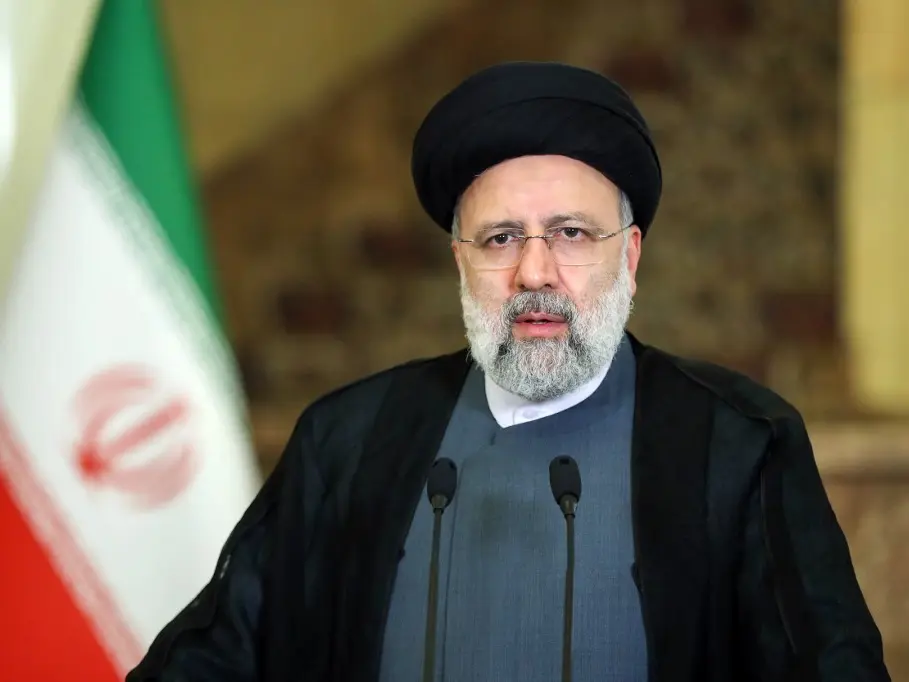Iran President draws “Red Line” amid anti-hijab protests
Iran’s President Ebrahim Raisi condemned the “chaos” sparked by a wave of women-led protests following the death of Mahsa Amini while in the custody of the Islamic republic’s morality police on Wednesday.
“Those who participated in the riots must be dealt with decisively, this is the people’s demand,” Raisi said in a televised interview.
“The Islamic Republic of Iran’s red line is people’s safety, and no one is allowed to break the law and cause chaos,” he said.
“The enemy has targeted national unity and wants to pit people against each other,” the ultraconservative president added, accusing Iran‘s archfoe, the US, of fomenting unrest.
Amini, a 22-year-old Kurdish woman, died on September 16th, three days after being arrested for allegedly violating Iran’s strict rules for women regarding the wearing of hijab headscarves and modest clothing.
Raisi said the country was in “grief and sorrow” over her death, and that forensic and legal experts would soon present a final report, but she also warned that “protests are not the same as riots.”
“Woman, Life, Freedom!” chanted protesters in Iran’s largest demonstrations in nearly three years, during which women defiantly burned their headscarves and cut their hair.
In a video shared on the BBC Persian service, British-Iranian Nazanin Zaghari-Ratcliffe, who spent six years in prison in Iran, cuts her hair.
According to their lawyer, Saleh Nikbakht, Amini’s bereaved parents have filed a complaint demanding “a thorough investigation” and the release of “all videos and photographs” of her while in custody.
Amini’s cousin, who lives in Iraq and is a member of a Kurdish nationalist group, claimed she died as a result of a “violent blow to the head” and that one officer vowed to “instil the rules in her and teach her how to wear the hijab and how to dress.”
As protests in Iran erupted for the 12th night in a row, Iran’s police command vowed to confront them “with all their might,” in a crackdown that one rights group claims have already killed at least 76 people.
– ‘Cowardly Assaults’ –
Iran has blamed outside forces for the unrest, including “counter-revolutionary” Kurdish groups based in northern Iraq, across the border from Amini’s home province of Kurdistan in Iran, where the protests first erupted.
Iran launched cross-border missile and drone strikes in Iraq’s Kurdistan region on Wednesday, killing 13 people after accusing Kurdish armed groups based there of fomenting unrest.
The UN mission in Iraq condemned the attacks, and the federal government in Baghdad summoned Iran’s ambassador.
The US condemned the “brazen attacks,” while Britain stated that Iraq’s “indiscriminate bombardment” demonstrates “a repeated pattern of Iranian destabilising activity in the region.”
Germany condemned the “escalation… in the context of domestic political protests in Iran” and rejected “attempts to locate the causes of the Iranian protests in the neighbouring country.”
One of the groups targeted, the Kurdish Democratic Party of Iran, charged that “these cowardly attacks are occurring at a time when the terrorist regime of Iran is unable to crack down on ongoing protests inside and silence the Kurdish and Iranian peoples’ civil resistance.”
– ‘It’s Not A Big Deal’
The Iranian government has attempted to downplay the crisis, despite the fact that its economy has already been hit by sanctions related to its nuclear programme.
Iranian Foreign Minister Hossein Amir-Abdollahian said at recent UN meetings that the protests were “not a big deal” for the clerical state’s stability.
“There will be no regime change in Iran. “Don’t play on the Iranian people’s emotions,” he told National Public Radio in New York, accusing “outside elements.” “of inciting violence
According to the Fars news agency, “around 60” people have been killed since Amini’s death. However, the Oslo-based organisation Iran Human Rights claims that the crackdown has killed at least 76 people.
The United Nations has expressed concern about Iran’s response, and countries around the world have condemned it, with Germany and Spain summoning Iranian ambassadors and the United States and Canada announcing new sanctions.
In an interview with AFP near Washington, the late Shah of Iran’s son praised the protests and urged the international community to increase pressure on the clerical leadership.
Reza Pahlavi, whose father was deposed in the 1979 Islamic Revolution, advocated for greater preparation for a future secular and democratic Iranian system.
“It is truly, in my opinion, the first revolution for women, by women – with the support of Iranian men, sons, brothers, and fathers,” Pahlavi said.
